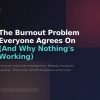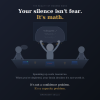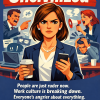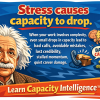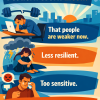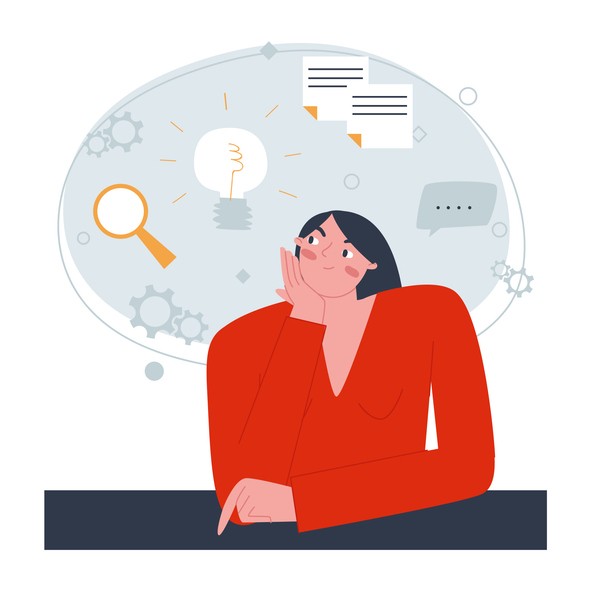
Critical Thinking Requires a Calm Nervous System
Your brain can't reason clearly when your body thinks you're being chased by a bear. Here's what actually happens to your thinking capacity under stress—and how to get it back.
Tuesday afternoon. Fourth time reading this email. It's three sentences but my brain keeps—
What was I saying?
Right. So 44% of professionals report daily workplace stress, which honestly feels low. And here's the thing nobody tells you about stress: it doesn't just make you feel scattered. It actually impairs your prefrontal cortex function while strengthening your amygdala response. Not metaphorically. The neuroscience is pretty clear on this — high catecholamine release during stress rapidly reduces prefrontal cortex firing while amplifying threat detection.
You're literally running on survival logic.
Which means all those articles about "10 ways to sharpen your critical thinking" are useless when your nervous system thinks you're being chased by a bear. Can't think critically if the thinking hardware is offline.
We get it.
The Thing Nobody Tells You
I spent years thinking I was just bad at thinking.
Couldn't hold multiple perspectives at once. Got weirdly defensive in normal conversations. Made decisions I'd regret like, an hour later. Maybe I just wasn't smart enough?
Except turns out I was running complex reasoning through a dysregulated nervous system. Like trying to run Photoshop on a phone at 2% battery. Or no wait, more like trying to write code while someone's yelling at you?
Point is: 76% of workers report experiencing burnout. Burnout doesn't just make you tired — it rewires neural pathways to prioritize threat detection. Dendritic atrophy in prefrontal cortex (thinking part) while amygdala extends (threat-scanning part).
Your capacity to think critically is tied to nervous system regulation. Not motivation. Physiology.
Can't reason your way out of fight-or-flight. Hardware isn't available.
Your Brain at Different Capacity States
So there's this progression. Not clean, not linear, but generally it goes like this:
Red/Can't-Even: Reactive Reasoning 🔴⚫
Everything's binary. Good/bad, safe/danger, with us/against us.
Wrote an angry email at 11pm last week. Read it next morning and just... deleted the whole thing. Made perfect sense at the time though — technically followed an argument structure, just missing about 80% of context and also basic humanity.
That's what stress does to the prefrontal cortex. Your brain isn't broken, it's doing exactly what it evolved to do: keep you alive right now. Critical thinking is a luxury your system can't afford in threat mode.
Goal: calm down enough that thinking becomes possible again. Body-first tools — breathwork, bilateral stimulation, anything signaling safety to your amygdala. When even reading feels like too much, simple nervous system regulation is the only move that works.
Yellow Zone: Situational Awareness 🟡
You start noticing thoughts instead of just being them.
"This is my stress voice."
That's metacognition. Difference between "everyone hates me" and "my brain is telling me everyone hates me, which is interesting but maybe not true."
I live here most days. Enough bandwidth to notice I'm catastrophizing, not always enough to stop it. Tools work but everything takes three times longer.
McKinsey research talks about curiosity and empathy as enduring capabilities — the stuff that makes thinking useful — but those only work when you're not using all your resources just staying regulated.
Yellow→Green: Analytical Awareness
Somewhere in here you get calm enough to analyze cause and effect. Consider alternative explanations instead of running with the first story.
Client missed a deadline. Immediate reaction: "They don't respect my time." Then: "Okay but why—" Then: "Or maybe something happened?"
Their kid was in the ER.
This is the observe → question → test loop. Slow at first, have to consciously interrupt automatic reactions, but it works when you have capacity for it. Building this skill means noticing the gap between stimulus and response—then actually using it.
Green Zone: Integrative Reasoning 🟢
Full working memory. Can hold multiple perspectives without brain shorting out.
This is what people mean by "critical thinking" but they skip mentioning it requires a regulated nervous system first. Can't just decide to do this when your body's in survival mode.
In Green you can acknowledge someone's point AND disagree with their conclusion. Hold uncertainty without panic. Change your mind without feeling like you lost. Feeling safe with people literally expands reasoning capacity according to the Surgeon General's research. Hard to think systemically when bracing for judgment.
Stable Green: Systemic Insight
Critical thinking becomes generative instead of defensive. You connect emotional data + evidence + context across systems. See patterns, think in second-order effects.
Not here most days honestly.
Requires sustained regulation even under mild stress. 77% of workers are disengaged, costs $8.8 trillion yearly — stable Green isn't the default for most people.
When I do hit it though? Not reacting to problems, seeing architecture underneath. Not binary, running simulations. Not about being smarter, about having bandwidth for intelligence to function.
What You Actually Get From This
Energy back maybe. Ability to think without wading through concrete. Clarity on good days. Better decisions that don't require apologizing later.
WHO says $1 invested in mental health returns $4 in productivity but what you really get is bandwidth. Space to think about something other than just surviving until 5pm.
This is Reset phase stuff. Stop the free-fall stage. Better focus makes teams more profitable (+23% according to Gallup) but practically for me it just means reading an email once and actually understanding it.
That's the ROI. Not performance metrics. Just... being able to think.
Your Brain Will Lie About This
"Next week will be calmer."
"After this project I'll think more clearly."
"Once things settle down—"
No. That's optimism bias. Your brain assumes future conditions will magically improve without you changing anything.
What happens: Yellow becomes Red. Red becomes Can't-Even. The brain promising "I'll be fine later" is the same brain that hasn't had full reasoning capacity in six months and doesn't realize it.
Already paying for this in lost hours and bad decisions. Question is just whether you keep paying or do something different.
How This Actually Works
Every time you notice you're dysregulated, use something body-first to calm down even a little, then reflect on what happened — you're training the neural circuitry linking emotional regulation and reasoning.
Prefrontal cortex literally remodels based on stress exposure. It's plastic, not fixed.
Not fast though. First hundred times feel forced. Your brain fights it because reactive thinking is efficient even when it's not accurate. But over time the nervous system learns to stay steady long enough for actual thinking.
Capacity literacy becomes critical thinking literacy. Something like that. Did I phrase that differently earlier? Maybe.
Currently writing this in Yellow Zone which explains why I keep losing the thread.
Where to Start
30-minute Reset is designed for Yellow/Red Zone. When you need your brain back but don't have bandwidth for complicated stuff. Body-first, then cognition. Order matters.
If you're in Green Zone and want to build the skill proactively, Focus & Self-Management pillar has tools for metacognition and pattern recognition.
Can't-Even? Tiny version: three deep breaths, name five things you can see, one glass of water. That's it. Thinking comes later.
I was going to write a better conclusion but honestly just got a Slack notification and—
That's the point though, right?
Build Capacity Before You Build Skills
Every skill in Emergent Skills works with your nervous system, not against it. 10 interconnected pillars designed for real workplace stress—when you need tools that actually work.
```

